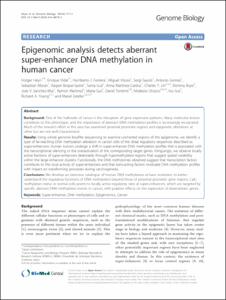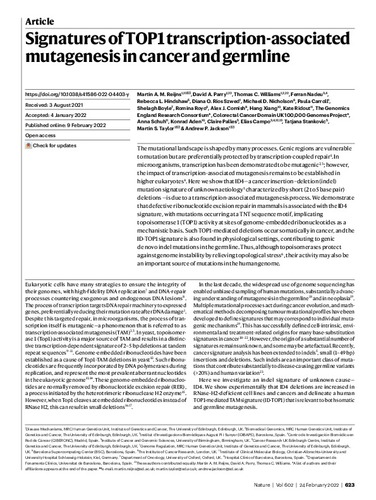Exploració per tema "Càncer--Aspectes genètics"
Ara es mostren els items 1-6 de 6
-
Deciphering Genomic Heterogeneity and the Internal Composition of Tumour Activities through a Hierarchical Factorisation Model

(MDPI, 2021)
(MDPI, 2021)
Article
Accés obertGenomic heterogeneity constitutes one of the most distinctive features of cancer diseases, limiting the efficacy and availability of medical treatments. Tumorigenesis emerges as a strongly stochastic process, producing a ... -
Epigenomic analysis detects aberrant super-enhancer DNA methylation in human cancer

(BioMed Central, 2016-01-26)
(BioMed Central, 2016-01-26)
Article
Accés obertBackground One of the hallmarks of cancer is the disruption of gene expression patterns. Many molecular lesions contribute to this phenotype, and the importance of aberrant DNA methylation profiles is increasingly recognized. ... -
Hydroxyapatite biobased materials for treatment and diagnosis of cancer

(2022-10-01)
(2022-10-01)
Article
Accés obertGreat advances in cancer treatment have been undertaken in the last years as a consequence of the development of new antitumoral drugs able to target cancer cells with decreasing side effects and a better understanding of ... -
ICO amplicon NGS data analysis: a web tool for variant detection in common high-risk hereditary cancer genes analyzed by amplicon GS junior next-Generation Sequencing

(2013-11-01)
(2013-11-01)
Article
Accés restringit per política de l'editorialNext-generation sequencing (NGS) has revolutionized genomic research and is set to have a major impact on genetic diagnostics thanks to the advent of benchtop sequencers and flexible kits for targeted libraries. Among the ... -
Identifying cellular cancer mechanisms through pathway-driven data integration

(Oxford University Press, 2022-08-02)
(Oxford University Press, 2022-08-02)
Article
Accés obertAbstract Motivation Cancer is a genetic disease in which accumulated mutations of driver genes induce a functional reorganization of the cell by reprogramming cellular pathways. Current approaches identify cancer pathways ... -
Signatures of TOP1 transcription-associated mutagenesis in cancer and germline

(Nature Research, 2022)
(Nature Research, 2022)
Article
Accés obertThe mutational landscape is shaped by many processes. Genic regions are vulnerable to mutation but are preferentially protected by transcription-coupled repair1. In microorganisms, transcription has been demonstrated to ...






